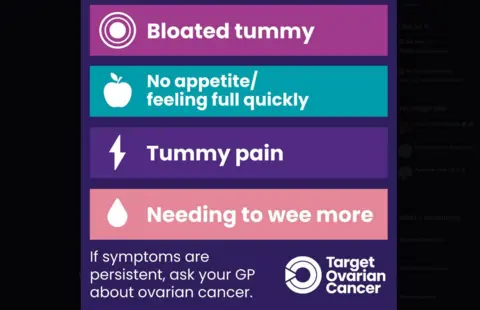BBC News NI Health Correspondent
A widower has said his wife received a late and terminal diagnosis due to an ongoing lack of awareness about symptoms of ovarian cancer among health professionals.
Stephen McCormick, whose wife Julie was diagnosed with stage 3 ovarian cancer, said the disease shouldn’t be ruled out as symptoms can be associated with other less serious conditions.
About 200 women are diagnosed with ovarian cancer in Northern Ireland each year.
The Department of Health and the Public Health Agency both said that due to constraints on the health budget there has been a “freeze” on almost all advertising spend across Health and Social Care.
 Stephen McCormick
Stephen McCormick“I think doctors need to rule it in before they rule it out, particularly if symptoms persist when a woman is being investigated for gynaecological or stomach problems,” the County Down man said.
Julie first complained of pelvic pain in 2021, however, it took a further two and a half years of investigations and tests before ovarian cancer was diagnosed.
Julie died 12 months later, aged 65.
Mr McCormick said his wife, an oncology nurse, was “fooled” by early tests being negative despite prolonged symptoms telling her something wasn’t right.
A CA125 blood test, which is used to measure a level of protein in the blood and is not a definitive test for ovarian cancer was initially clear and caused no concern.
But according to Mr McCormick, despite his wife’s constant visits to the GP and other specialists with stomach pain and gynae issues, ovarian cancer wasn’t a line of inquiry.
‘On a mission’
Mr McCormick said he’s “passionate” about raising awareness of ovarian cancer and is “on a mission” to get a public awareness campaign up and running across Northern Ireland.
That mission began on 23 June 2024, the day Julie died.
 X
XPosting on social media that day, Mr McCormick urged the public to be aware of the “sneaky symptoms” of ovarian cancer and to get checked if they persist.
One year on, he said little has changed with no desire among politicians and health officials to put it on the Executive’s agenda.
“I’d like a big billboard, radio and television campaign educating people about the symptoms and that if they persist you should continue seeking help and suggesting being tested for ovarian cancer,” said Mr McCormick.
“When you are diagnosed late, the outcomes are much poorer and therefore if women can get to see their GP sooner, they have a better chance of being diagnosed and a better chance of survival.”
He also said he isn’t confident that the Department of Health will decide to go big on the cancer as he appreciates it has a long list of priorities.
 Target Ovarian Cancer
Target Ovarian CancerResearch by Queen’s University Belfast has found the most common route for women to be diagnosed with ovarian cancer was in an Emergency Department.
Between 2017 and 2021, 35% (70) of cases were diagnosed on average each year via an emergency presentation, and 27% (55) of cases were diagnosed by a red-flag referral route.
Dr Damien Bennett, director of the NI Cancer Registry, said the findings highlighted the need to drive home the message that if symptoms persist – including if they happen 12 times in a month – it is not something that should be ignored and should be immediately followed up with the woman’s GP.
“These symptoms can overlap with other conditions that are benign and can potentially make it more difficult for the public to potentially approach health care professionals,” he said.
“Those symptoms also make it more difficult for health care professionals to come to a diagnosis – but the greater awareness about all of this the better.”
The research also found that 32% of cases were diagnosed at stage 1 (early stage), while 20% were diagnosed at an advanced stage.
On average there were 122 deaths per year from ovarian cancer.








